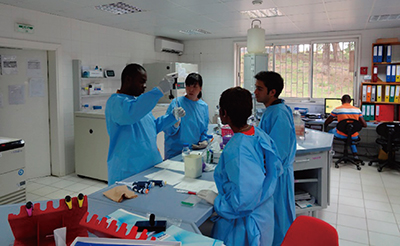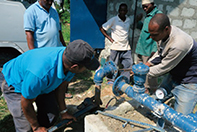(4) Partnership with universities
Some of the roles of universities are: to contribute to the development of developing countries, to develop human resources that will be responsible for international cooperation, and to organize and disseminate the philosophy and theories of Japan’s assistance. Taking these roles of universities into account, Japan is striving to cooperate with various universities in terms of broad intellectual cooperation, regarding all aspects of the cycle of assistance, from organizing the theories of assistance to putting it into practice and giving back to the Japanese people through education. As a matter of fact, Japan is promoting various projects in collaboration with many universities, including technical cooperation, ODA loan projects, and the JICA Partnership Program (JPP).
As one example, with the objective of developing advanced human resources who will become the core of socioeconomic development in developing countries, Japan utilizes the JICA Project for Human Resource Development Scholarship (JDS) to accept young officials from developing countries as international students in a cumulative total of 36 universities. In FY2018, 321 students were newly accepted.

Ms. Yuri Ushijima from the Institute of Tropical Medicine, Nagasaki University providing technical guidance in research at Centre de Recherches Médicales de Lambaréné (CERMEL) in Lambarene city, Moyen-Ogooué state in Gabon, under the Science and Technology Research Partnership for Sustainable Development Program (SATREPS). See “Project Introduction” for details. (Photo: Jun Aoki, JICA operational liaison specialist)
Moreover, under the African Business Education Initiative for Youth (ABE Initiative), through industry-academia-government cooperation, 129 departments in 72 universities throughout Japan are accepting trainees. Furthermore, Japan has implemented the ASEAN University Network/Southeast Asia Engineering Education Development Network (AUN/SEED-Net) Project*, as a JICA technical cooperation project, in which Japan is working to strengthen the network among Japanese and ASEAN universities, collaborating with the industrial sector, and engaging in joint research with neighboring countries.
In addition, a rapid surge in threats stemming from global issues such as global warming and infectious diseases in recent years calls for further advancement in science and technology for solutions. There is an increasing expectation for Japan’s advanced science and technology especially in developing countries, since they are vulnerable to the impacts of these threats, and thus require research and development based on their regional needs. At the same time, it is also imperative for universities and research institutions in developing countries to improve their self-sustainable capabilities in research and development, and build a framework which promotes continuous activities. With this awareness of the issues in mind, JICA has been implementing the “Science and Technology Research Partnership for Sustainable Development (SATREPS)” (Note 8) since 2008, in collaboration with the Ministry of Education, Culture, Sports, Science and Technology (MEXT), Japan Science and Technology Agency (JST), and Japan Agency for Medical Research and Development (AMED). International joint studies between universities and research institutions of Japan and developing countries are being conducted through SATREPS (see “Stories from the Field” for specific examples).
Such partnerships with universities contributes to academic advancement in solving problems in developing countries, as well as the globalization of Japanese universities by welcoming trainees from overseas to train and conduct research in Japan.
- *ASEAN University Network/Southeast Asia Engineering Education Development Network (AUN/SEED-Net)
- AUN/SEED-Net was launched in 2001 as a university network comprising 26 top-ranking engineering universities in 10 ASEAN member countries, and 14 partner universities from Japan. It implements various research and education activities to produce advanced human resources in the engineering sector, with the aim of realizing sustainable development in Southeast Asia and Japan. This initiative is implemented with mainly the support from the Government of Japan through JICA, in cooperation with the governments and universities of Southeast Asia and Japan.
●Tanzania
Master’s Degree and Internship Program of African Business Education Initiative for Youth (ABE Initiative)
Technical Cooperation (Training) / Loan Aid (August 2015 – September 2017)
Zanzibar Urban Water Distribution Facilities Improvement Project
Preparatory Survey (February 2016 – December 2017)

Working to repair a well by the Zanzibar Water Authority (ZAWA) (Photo: JICA)
In Unguja, the largest island in the Zanzibar Archipelago in Tanzania, time restrictions in water availability and water outages were a part of everyday life. This lack of water supply was caused by the deteriorated water distribution facility, which was kept unrepaired due to financial difficulties. In response, Japan supported the transfer of technology relating to the installation of customer management systems and collection of fees, and established a water fee collection system for the Zanzibar Water Authority (ZAWA), in its technical cooperation project, “Project for Enhancement of Water Supply Management of Zanzibar Water Supply,” from 2008 to 2010. The current Director of ZAWA, Mr. Mussa Ramadhan Haji, has worked tirelessly as the ZAWA Customer Manager during Phase 2 of the Project (2011 – 2015). The implementation of this project contributed to an improvement of the managerial capabilities of ZAWA, which led to the provision of a stable water supply service.
Mr. Haji participated in the ABE Initiative in 2015, after the conclusion of Phase 2. During the Program, he carried out a research in Toyo University on the relationship between the installation of water meters and water usage in ZAWA, and obtained a master’s degree in 2017. After returning to his country, he worked at the President’s Office – Public Service Management, and was appointed to Director of ZAWA by the President of Zanzibar in March 2018.
Director Haji strives to improve the water supply services of ZAWA under his strong leadership, and is also contributing to the development of the ODA Loan project, “Zanzibar Urban Water Distribution Facilities Improvement Project.”
- Note 8: Refer to “Glossary” (p.23) for information on SATREPS.
